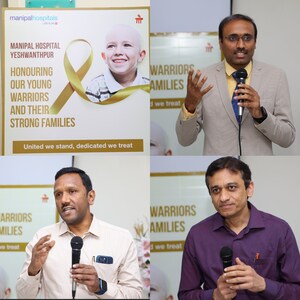Manipal Hospital Whitefield endeavors to raise awareness levels on treatment methods for progressive cancers
BENGALURU, India, Dec. 16, 2022 /PRNewswire/ -- Manipal Hospital Whitefield on December 13th organized an exclusive roundtable conference highlighting the advanced treatment methods for people suffering from progressive cancers. In most cases, treating patients with end-stage cancer is challenging. However, there are various advanced technologies available now that can help ease the symptoms, increase the life expectancy, and even cure the patient, depending on the nature of the cancer. At the conference, Dr. Rajashekar C Jaka, Consultant - Surgical Oncology, Manipal Hospital Whitefield, spoke in detail on hyperthermic intraperitoneal chemotherapy (HIPEC), pressurized intraperitoneal aerosol chemotherapy (PIPAC), Mediastinoscopy, robotic surgery, and more, which can improve survival rates and provide a better quality of life for end-stage cancer patients.
According to a recent survey by ICMR, 1 in 9 Indians are likely to suffer from cancer and the cases may increase by 12.8 percent from 2020 to 2025. The majority of the cases are reported in the age group between 40 – 64 years of age. The cases reported among men are lung cancer and in women breast cancer which needs to be addressed immediately. This survey is certainly alarming for the healthcare system and people suffering from these cancers. It is essential for people to be aware of the surgical procedures and the existing high-end technologies for early detection and the right treatment methods for these cancers.
In a bid to raise awareness levels among the masses, Manipal Hospital Whitefield organized a round-table conference on advanced technologies that can diagnose cancer early on and the types of treatment methods. The discussion dwelt in detail on HIPEC and PIPAC, which are invasive and non-invasive procedures. These are sterilized chemotherapy solutions that kills cancer cells not visible to the eyes and are performed post-surgery to avoid the spread of cancer to other organs. The doctor explained the advantage of minimally-invasive surgery as it allows precise cuts and fewer incisions, as a result of which patients feel lesser pain and recover faster.
The conference also highlighted how some of the advanced drugs and technologies, including Chemoport injections and Sentinel Lymph Node Biopsy, can significantly help in early detection of the disease, improve the quality of surgery, and decrease the side-effects in patients. Dr. Rajashekar C Jaka described how technologies like laparoscopes, robotics, and endoscope, have been playing a major role in enhancing patient care.
Although, when it comes to robotic surgery people tend to get apprehensive but it gives the surgeon a 360 view and an in-depth image of the organs where the cancer is situated, which makes it easy for them to perform the surgery. This method leads to minimizing blood loss and an immediate recovery period for the patients. The future of robotics is evolving constantly and would soon incorporate Artificial Intelligence, which would make surgeries cost-effective and result oriented.
On this occasion, Dr. Rajashekar C Jaka, Consultant - Surgical Oncology, Manipal Hospital, Whitefield, said, "For treating cancers, other than advanced technologies, multidisciplinary care is essential. Previously, due to the lack of advanced technologies, it was difficult to diagnose and treat cancer patients. But now the scenario has changed dramatically. The process of surgeries has become easier. Also, post-surgery, patients experience less pain, and recover faster than in earlier times. Besides, it helps us to understand and accurately diagnose the cancer."
The doctor also spoke extensively about the technology used for an easy diagnostic method including Gyneco-Ovarian check-ups (to detect cancer in its early onset), frozen section biopsy, Mediastinoscopy ( a lighted instrument (mediastinoscope) which is inserted in the space in the chest between the lungs and the tumor extracted for biopsy). These tests also help the patients get accurate diagnoses and give immediate results on which stage of cancer they are in.
In most cases, people relate cancer to suffering and mortality. However, they must be made aware that certain cancers are curable, and that the healthcare system is evolving by the day, finding treatments for incurable diseases.
About Manipal Hospitals:
As a pioneer in healthcare, Manipal Hospitals is among the top healthcare providers in India serving over 4 million patients annually. Its focus is to develop an affordable, high-quality healthcare framework through its multispecialty and tertiary care delivery spectrum and further extend it to out-of-hospital care. With the completion of the acquisition of 100% shareholding in Columbia Asia Hospitals Private Limited and Vikram Hospital (Bengaluru) Private Limited, the integrated network today has a Pan-India footprint of 27 hospitals across 15 cities with 7,600+ beds, and a talented pool of 4,000 doctors and an employee strength of over 11,000.
Manipal Hospitals provide comprehensive curative and preventive care for a multitude of patients from around the globe. Manipal Hospitals is NABH, and AAHRPP accredited and most of the hospitals in its network are NABL, ER, and Blood Bank accredited and recognized for Nursing Excellence. Manipal Hospitals has also been recognized as the most respected and patient-recommended hospital in India through various consumer surveys.
Photo: https://mma.prnewswire.com/media/1970237/Dr_Rajashekar_Jaka_Oncology.jpg







Share this article